THE END OF PROGRESS
NEW DIRECTIONS IN CRITICAL THEORY
New Directions in Critical Theory
AMY ALLEN, GENERAL EDITOR
New Directions in Critical Theory presents outstanding classic and contemporary texts in the tradition of critical social theory, broadly construed. The series aims to renew and advance the program of critical social theory, with a particular focus on theorizing contemporary struggles around gender, race, sexuality, class, and globalization and their complex interconnections.
Narrating Evil: A Postmetaphysical Theory of Reflective Judgment, Mara Pa Lara
The Politics of Our Selves: Power, Autonomy, and Gender in Contemporary Critical Theory, Amy Allen
Democracy and the Political Unconscious, Nolle McAfee
The Force of the Example: Explorations in the Paradigm of Judgment, Alessandro Ferrara
Horrorism: Naming Contemporary Violence, Adriana Cavarero
Scales of Justice: Reimagining Political Space in a Globalizing World, Nancy Fraser
Pathologies of Reason: On the Legacy of Critical Theory, Axel Honneth
States Without Nations: Citizenship for Mortals, Jacqueline Stevens
The Racial Discourses of Life Philosophy: Ngritude, Vitalism, and Modernity, Donna V. Jones
Democracy in What State?, Giorgio Agamben, Alain Badiou, Daniel Bensad, Wendy Brown, Jean-Luc Nancy, Jacques Rancire, Kristin Ross, Slavoj iek
Politics of Culture and the Spirit of Critique: Dialogues, edited by Gabriel Rockhill and Alfredo Gomez-Muller
Mute Speech: Literature, Critical Theory, and Politics, Jacques Rancire
The Right to Justification: Elements of Constructivist Theory of Justice, Rainer Forst
The Scandal of Reason: A Critical Theory of Political Judgment, Albena Azmanova
The Wrath of Capital: Neoliberalism and Climate Change Politics, Adrian Parr
Media of Reason: A Theory of Rationality, Matthias Vogel
Social Acceleration: The Transformation of Time in Modernity, Hartmut Rosa
The Disclosure of Politics: Struggles Over the Semantics of Secularization, Mara Pa Lara
Radical Cosmopolitics: The Ethics and Politics of Democratic Universalism, James Ingram
Freedoms Right: The Social Foundations of Democratic Life, Axel Honneth
Imaginal Politics: Images Beyond Imagination and the Imaginary, Chiara Bottici
Alienation, Rahel Jaeggi
The Power of Tolerance: A Debate, Wendy Brown and Rainer Forst, edited by Luca Di Blasi and Christoph F. E. Holzhey
Radical History and the Politics of Art, Gabriel Rockhill
The Highway of Despair: Critical Theory After Hegel, Robyn Marasco
A Political Economy of the Senses: Neoliberalism, Reification, Critique, Anita Chari
THE END OF PROGRESS
DECOLONIZING THE NORMATIVE
FOUNDATIONS OF CRITICAL THEORY
Amy Allen

Columbia University Press New York
Columbia University Press
Publishers Since 1893
New York Chichester, West Sussex
cup.columbia.edu
Copyright 2016 Columbia University Press
All rights reserved
E-ISBN 978-0-231-54063-6
Library of Congress Cataloging-in-Publication Data
Allen, Amy.
The end of progress : decolonizing the normative foundations of critical theory / Amy Allen.
pages cm
Includes bibliographical references and index.
ISBN 978-0-231-17324-7 (cloth : alk. paper) ISBN 978-0-231-54063-6 (e-book)
1. Critical theory. I. Title
B809.3.A45 2015
142dc23
2015018980
A Columbia University Press E-book.
CUP would be pleased to hear about your reading experience with this e-book at .
Cover design: Black Kat Design
Cover image: Shibboleth by Doris Salcedo; photo by Shaun Curry/AFP/Getty images
References to websites (URLs) were accurate at the time of writing. Neither the author nor Columbia University Press is responsible for URLs that may have expired or changed since the manuscript was prepared.
For Chris
Progress occurs where it ends.
Theodor Adorno, Progress
I would like to say something about the function of any diagnosis concerning the nature of the present. It does not consist in a simple characterization of what we are but, insteadby following lines of fragility in the presentin managing to grasp why and how that-which-is might no longer be that-which-is. In this sense, any description must always be made in accordance with these kinds of virtual fracture which open up the space of freedom understood as a space of concrete freedom, that is of possible transformation.
Michel Foucault, Critical Theory/Intellectual History
The subaltern fractures from within.
Dipesh Chakrabarty, Provincializing Europe
CONTENTS
This book aims to make a contribution to the ongoing project of critical theory. But construing the aim of the book in this way already raises a difficulty, for the term critical theory is contested and unstable, and can refer to a wide variety of theoretical projects and agendas. In its most narrow usage, critical theory refers to the German tradition of interdisciplinary social theory, inaugurated in Frankfurt in the 1930s, and carried forward today in Germany by such thinkers as Jrgen Habermas, Axel Honneth, and Rainer Forst and in the United States by theorists such as Thomas McCarthy, Nancy Fraser, and Seyla Benhabib. In a more capacious usage, critical theory refers to any politically inflected form of cultural, social, or political theory that has critical, progressive, or emancipatory aims. Understood in this way, critical theory encompasses much if not all of the work that is done under the banner of feminist theory, queer theory, critical race theory, and post- and decolonial theory. A distinct but related capacious usage of the term refers to the body of theory that is mobilized in literary and cultural studies, otherwise known simply as theory. Here critical theory refers mainly to a body of French theory spanning from poststructuralism to psychoanalysis, and including such thinkers as Michel Foucault, Jacques Derrida, Gilles Deleuze, and Jacques Lacan. Obviously there are significant overlaps and cross-fertilizations between these latter two senses in particular, and my point here is not to attempt to draw hard and fast distinctions between them. Rather, my point is simply to map some of the complicated and shifting terrain on which this book is situated.
For once we have at least provisionally mapped the terrain in this way, it is striking how fraught and contested the interactions and dialogues between critical theory in the narrow sense and critical theory in these two wider senses of the term are. Although the former has gone some way toward incorporating the insights of feminist theory (primarily through the work of Fraser and Benhabib) and critical race theory (through the recent work of McCarthy), its long-running feud with French theory is well known. And up to now, critical theory in the narrow sense of that term has largely failed to engage seriously with the insights of queer theory and post- and decolonial theory. No doubt, these last two points are closely related, insofar as French theoryand the work of Foucault in particularhas been so formative for the fields of queer and postcolonial theory.
In this book, I attempt to work across the divides between these different understandings of critical theory, particularly those between the Frankfurt School approach to critical theory, the work of Michel Foucault, and the concerns of post- and decolonial theory. My main

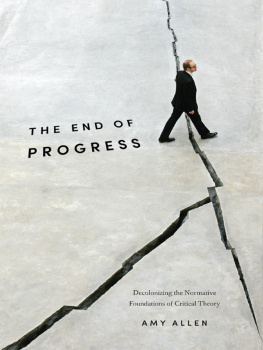


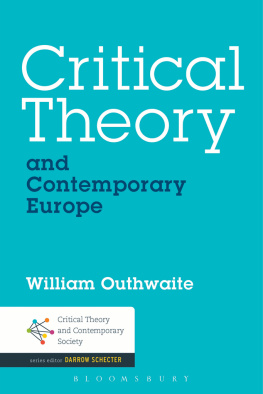
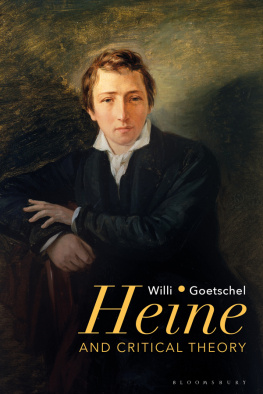
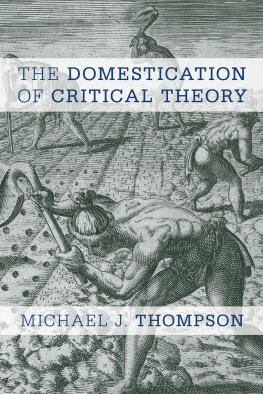

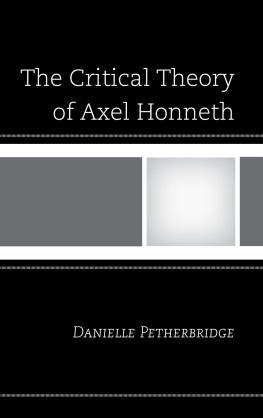
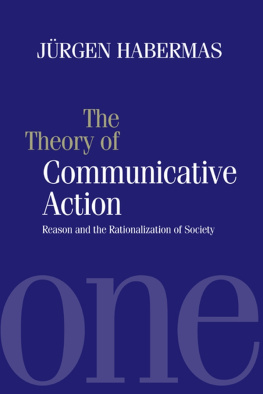
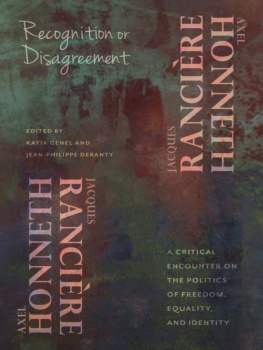
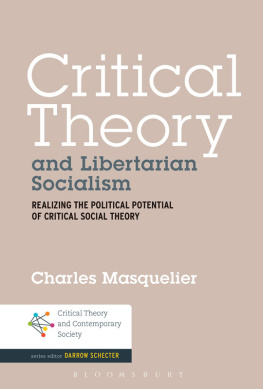
 Columbia University Press New York
Columbia University Press New York